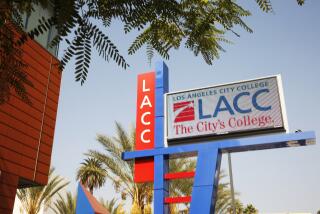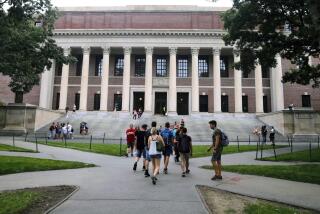Searching for elites among immigrants
- Share via
NEW YORK — After completing a freshman seminar about immigration in New York, Anita Sonawane, a brainy undergraduate who happens to be a New York immigrant, had a transformative aha moment. It was something the professor said.
“Oh, come on, Anita, you know you’re not going to be a doctor,” Jeff Maskovsky, an urban studies professor at Queens College, told her, hoping to challenge the idea that the only way to succeed in America was to practice medicine.
No, she was not destined to be a doctor, she later realized. “Whenever I started talking, I couldn’t help myself, politics just came into the discussion,” says Sonawane, 18, a budding community activist and economics major.
Six years ago Sonawane arrived here from Dubai, United Arab Emirates, with her Indian parents and nowhere to live. They ended up moving in briefly with the taxi driver who picked them up at the airport. The family has since bought an apartment in Queens, and her father has found work.
And today Sonawane is getting a first-rate education, same as any pedigreed New Yorker, but without the Ivy League price tag. She is among 1,200 scholars who attend for free the Macaulay Honors College at the City University of New York, the nation’s largest urban public university.
This city has long created public institutions to educate immigrants and their sons and daughters, turning generations into doctors, lawyers and entrepreneurs, not to mention Nobel Prize winners and Rhodes scholars. Now, that tradition is having a renaissance.
In recent years, many U.S. universities have established honors colleges, but CUNY’s has an extra goal of turning ambitious immigrants and the children of the working class into worldly New Yorkers with a heart for public good.
Macaulay scholars are required to take a series of seminars about New York and clock 30 hours of public service. They each get a laptop, $7,500 to study abroad or defray costs during an unpaid internship and a “passport” to New York arts and cultural venues. Each student is also assigned four advisors who push and coddle, strategize and negotiate, with the intention of getting these least-entitled students on equal footing with the elite.
Ann Kirschner, Macaulay’s dean, says that a decade from now, one way she’ll know the Honors College is a success is if she reads that a graduate is elected mayor of New York: “It’s not that we think New York is the only place to live -- well, secretly we do -- but we want our students to have a sense of themselves as people who can both achieve academically and become engaged New York citizens.”
Sonawane was taking a seminar last year titled, “The Peopling of New York,” when she had her epiphany. Maskovsky says he designed the course to upset students’ notions of the city “as this wonderful melting pot.”
“One of my challenges was to get students like Anita to think beyond Pollyanna ideas, and gain a serious, scholarly understanding of how different groups have unequal access to economic power and how they struggle between them,” he said.
After Sonawane completed the course, one of her advisors and Maskovsky helped her secure an internship with then-Sen. Hillary Rodham Clinton.
“Our goal,” the professor says, “is to take these diamonds in the rough -- kids brimming with possibility who haven’t had private SAT training or top high school prep -- and challenge them to think broadly about their futures.”
For a while this mission had fallen by the wayside out of a commitment to another public policy ideal: affirmative action. In the early 1970s, CUNY dropped admission standards; but in 2001, new leadership set aside money to create an honors college, naming it for a wealthy graduate, William E. Macaulay, who donated $30 million to turn a Manhattan townhouse into a center for CUNY’s cream of the crop.
There is Sameen Farooq, 21, a premed student whose parents were doctors in Pakistan but now run a dollar store in Brooklyn. He is a frenetic volunteer and this year went to South Africa to help homeless children. “We see our future, and we’re chasing it at 100 miles per hour,” he said.
There is Ilya Ryvin, 19, a film production major who’d like to be the next Martin Scorsese. His advisors have pressed him to take more classes and volunteer. Next winter, he’ll study film in Japan. He has not left the country since he arrived, at age 4, from Belorussia, now known as Belarus.
Many students, in fact, are driven academically but have to be encouraged to broaden their interests, says Pamela Degotardi, a Macaulay advisor. Some hold themselves back; others have parents worrying about them.
Degotardi recalls persuading parents of an Orthodox Jewish student, an English lit major, to let her to study at Oxford. It would be great for her academic standing, Degotardi told them. It turned out that sharing the adventure with a Christian girl and an African American boy was also important for her personal growth.
Degotardi says Macaulay students often have a sense of having achieved little through birthright and everything through self-transformation -- and struggle: “I keep a well-stocked supply of Kleenex in my office -- and chocolate.”
Throughout the sprawling CUNY system, there is some resentment that at a time of budget cuts, a mere fraction of its 400,000 students are receiving such treatment and precious resources. But supporters say that by recruiting the city’s top high school students for seven of CUNY’s 11 campuses, Macaulay is not only elevating intellectual life throughout the system but also boosting CUNY’s reputation nationally.
Since Macaulay’s first graduating class in 2005, it has had Truman, Ford, Goldwater and Fulbright fellowship winners. And at graduation this week, among the class of 2009 is a Rhodes scholar.
--
More to Read
Sign up for Essential California
The most important California stories and recommendations in your inbox every morning.
You may occasionally receive promotional content from the Los Angeles Times.









